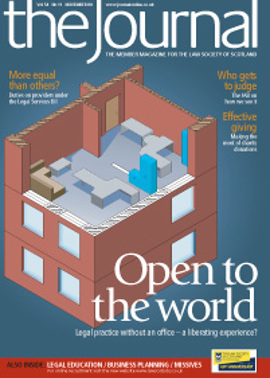Let the light in

From time to time, like many other civil practitioners, I like to do a bit of personal injury.
What a game it is!
Letters are exchanged with insurers, sometimes more in hope than expectation, but often towards a resolution that leaves both sides, if not happy, then at least content. ADR at work.
Regrettably this is not always the case and the matter proceeds to court. Then the real fun begins.
I am old enough to remember the pre-Macphail age, when sheriff court practice was still in the hands of one Dobie, who was believed to have served as a sheriff, somewhere and at some time, although not, admittedly, during the lifetime of anyone still alive. His opus, years out of print, was spoken of in awed terms by those fortunate enough ever to have glimpsed a copy, invariably in the hands of a wizened practitioner of the pre-1993 ordinary court. Civil procedure was then a tradecraft as guarded as the secrets of MI6. It was, nonetheless, at least written down somewhere, albeit a long time ago, and possibly originally in Latin. The art of civil pleadings, on the other hand, belonged more to the realms of the KGB, passed on entirely by word of mouth and on a strictly “need to know” basis.
Come the 1993 rules, all this was swept away... except it wasn’t. The “Final, FINAL, FINAL continuation for adjustment was simply replaced by the indefinite sist, or the lost world of rule 18 procedure. It remained the case that the careless use of the word “ensure” could have almost as significant a consequence procedurally as the carelessness giving rise to the litigation in the first place.
Meanwhile, in a land far, far away, known to its inhabitants only as the Court of Session, the practitioners, posh though they might be, and possibly in insufficient awe of the value of oral tradition, had decided that the fate of a cause should depend on the facts and the law rather than the ability to reduce that same oral tradition to the written page, or at least to learn from experience.
Thus came the Coulsfield Rules.
By the time you read this, these rules are now in the sheriff court in relation to personal injury actions:
“This is what the pursuers say happened to them.
And this is why they say the defender must compensate them for it.
And this is what the pursuer says the consequences were.
And what appropriate compensation should be.
Now, let’s hear what the defender says about each proposition in turn.
And then, let’s go to proof.”
Dangerously simple, you
might say, but, oddly enough, the Edinburgh boys and girls seem to think it works. So much so that they’ve persuaded the powers that
be to impose it on the rest of us.
Where might this end?
The pursuer pleads “I love my wean and would like to see her.”
The defender pleads “He’s a drunken bum and his house is a coup.”
Maybe not quite, but at least an end to the standard verbiage: “It being in the best interests of the child and it being necessary that the pursuer should be entitled to a contact order, together with interim contact, decree should
be granted as craved.” (Presumably, rehearsed for the benefit of those sheriffs who have negotiated the Judicial Appointments Board without the remotest idea of what might constitute the legal tests in this area.)
We live in a modern age. A few weeks ago, a client phoned me to observe that they had spotted on the internet that their case was on the by order roll at a forthcoming Airdrie ordinary court. Why, they inquired? And what was the by order roll anyway? Much as I was tempted to respond that this was no business of theirs, I gave the best answer I could.
I consoled myself that at least they would never understand the pleadings, even if they ever saw them.
Enough levity.
There are three elements to any civil action: the facts, the law and the proposed remedy. Defenders’ lawyers already drill down through the legacy of Dobie to extract that from the writ within five minutes of being instructed. They shouldn’t be required to do so, still less be required (or at least encouraged) to respond in kind. Plain English and focus on the issues should be the order of the day.
So, if you too are predisposed to a bit of personal injury, get to know the new rules. Equally importantly however, get prepared for things to come.
In this issue
- The equality, diversity and discrimination agenda: change and challenge ahead
- Justice on the green front
- Let the light in
- Needs of the family
- Reality on the West Bank
- Outside of the box
- Effective philanthropy
- Case for the defence
- Taking on the system
- Same rules for all?
- The benchmark
- Law reform update
- From the Brussels Office
- Appreciation: David Hector MacNeill
- Halfway to the Big Bang
- The same but different
- Five steps forward
- Ask Ash
- Preparing for disaster
- Rules a-changing
- Fair competition
- Time on whose side?
- 40 days and 40 nights
- Hear the grown-ups
- Problems of transition
- Scottish Solicitors' Discipline Tribunal
- Website review
- Book reviews
- Life on the other side
- Never waste a good crisis






